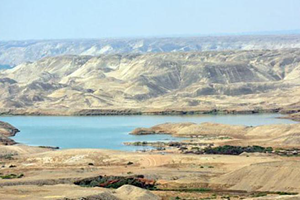Many new policies and efficiency improvements have been undertaken to augment, conserve, reuse and recycle all available freshwater. The Government has constructed dams and the Disi-Amman conveyance system to mobilize new water sources. It is exploring additional sources of supply such as deep aquifers and brackish and large-scale seawater desalination. Efforts are being made to optimize the use of existing resources by reducing physical and commercial losses. Energy efficiency improvements are part of the strategy as currently 14% of the country's energy resources are consumed by water delivery. Despite these improvements, there remains a critical imbalance between supply and demand, especially in a context of regional insecurity and the social, economic and environmental impacts of climate change.
The National Water Strategy 2016-2030 defines the steps to ensure a sustainable future for the water sector in Jordan; it uses the distinct opportunity to reinforce and strengthen integrated water resources planning and management that is aligned with the adopted Sustainable Development Goals (SDGs) by the United Nations in September 2015, revising the scope, context and relevance of the strategy for the sustainable future of water resource management in the coming decades. The National Water Strategy builds on the vision that by 2030, Jordan Water sector will gain more resilience.
The Strategy aims to create new momentum for the sector to be better prepared; do business differently and more efficiently; add value to national development in conjunction with other national socioeconomic sustainability initiatives; engage in institutional reform for greater efficiency and effectiveness; and improve interpectoral linkages to generate greater synergy and impact on the health and economic well-being of all Jordanians.


The strategy also addresses cross-cutting issues of climate change adaptation; transboundary/shared water resources; humanitarian WASH sector coordination; public/private partnerships; and the economic dimensions of water. The strategy identifies the results (objectives) to be achieved and reflects the Government's national vision for the sustainable development of the water sector. Within the timeframe of this strategy, the Ministry of Water and Irrigation (MWI) will adopt a sector-wide integrated water resources planning and management approach, develop sector policies and legislation to enhance performance, equitable service provision and optimization of available resources, initiate institutional reforms to restructure sector management, enhance fiscal discipline in cost recovery, improve internal efficiencies in sector coordination and management and build technical capacity.
MWI will coordinate and lead the implementation of the water-related SDGs and targets in Jordan, understand deeper of the available amounts, actual quality and natural protection of Jordan's water resources as a foundation for effective decision making, develop new partnerships with civil society and engage with all stakeholders through regular consultations in water sector project planning, thus building awareness of the efficient use and conservation of water and protecting the water infrastructure. Other measures include developing appropriate, cost-responsive water and wastewater tariffs in municipal, irrigation and industrial water use, developing 'new water' through rain harvesting, recycling, innovation, adaptation, new technology and peoples' participation and improve energy efficiency and renewable energy use in the water sector.
Parallel to this document, MWI is currently finalizing an updated sector investment program, together with Water Authority of Jordan (WAJ) and Jordan Valley Authority (JVA), to ensure that viable financing is available for the Jordan 2025 National Plan and to attract resources for implementation of the National Water Strategy 20162030. The work on Sector Capital Investment Program (CIP) 2016-2025 is based on what has been achieved on the sector CIP of 2002-2011. The Sector CIP explains the infrastructure investments necessary to accommodate the projected development, taking into consideration sustainability of services and priorities within the local context, in addition to socioeconomic factors, and with timelines that are coordinated with population projections and development needs. It reflects the identified capital expenditures and sets a framework for MWI and the Government to secure the funds for its implementation, whether using government funds or through loans or other means, as necessary.


Source:
Jordan Ministry of Water and Irrigation
Web: www.mwi.gov.jo











